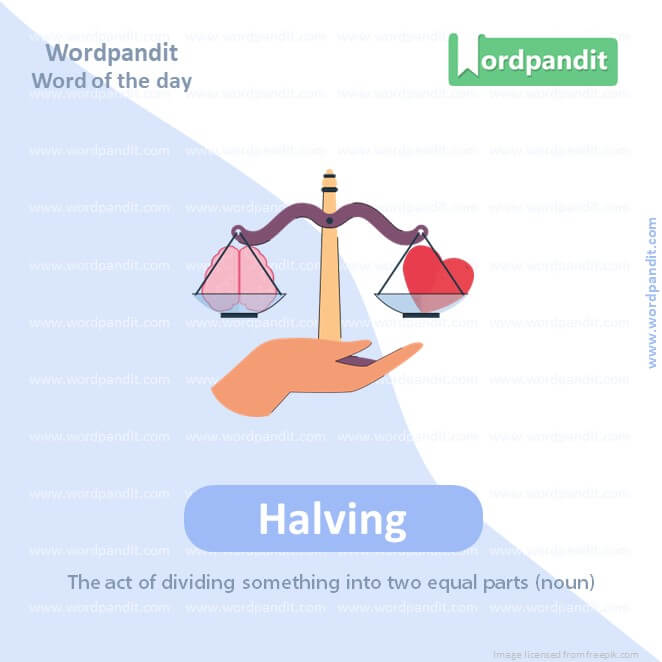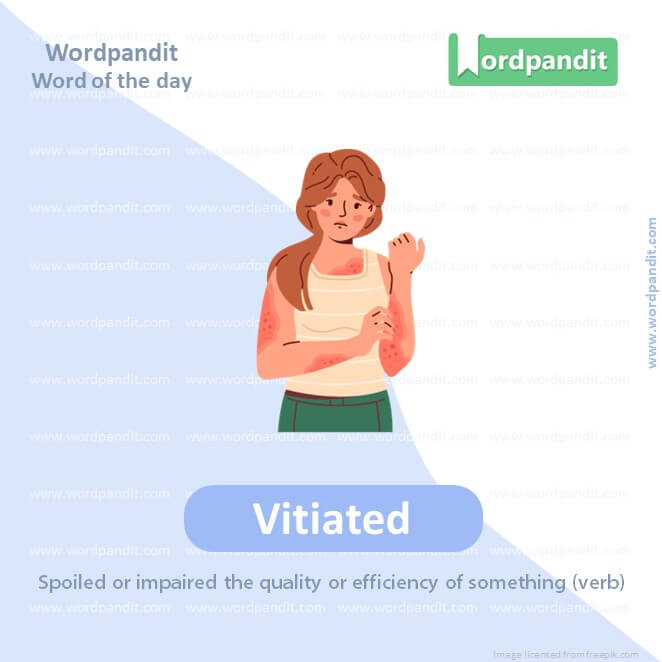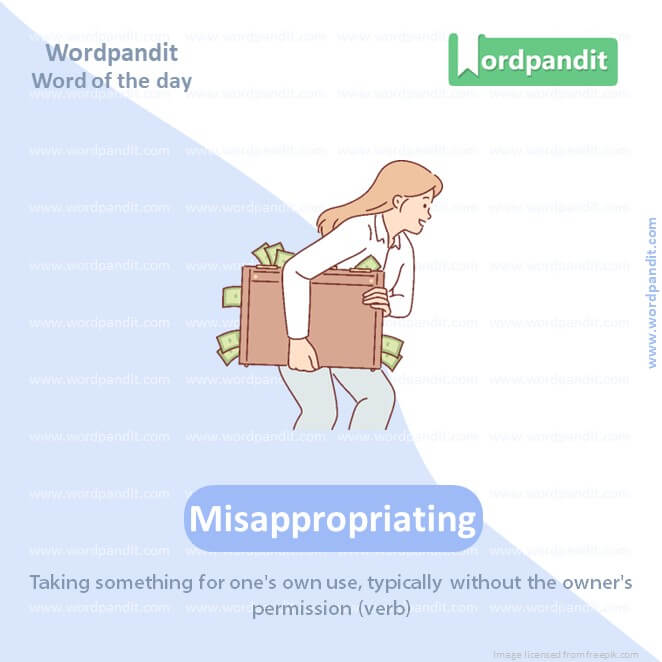Daily Vocabulary Words: List of Daily Used Words
Hi there. Welcome to this special section @ Wordpandit.
Our endeavour here is straightforward: highlighting important daily vocabulary words, you would encounter in The Hindu. This is your repository of commonly used words; essentially, we are posting a list of daily used words. Hence, this has significant practical application as it teaches you words that are commonly used in a leading publication such as The Hindu.
Visit the website daily to learn words from The Hindu.

WORD-1: Halving
CONTEXT: the second-largest component of the services economy, the omnibus trade, hotels, transport, communication and broadcasting sector — also a large provider of jobs — is estimated to witness more than a halving in the pace of growth — to 6.3%, from 14% last fiscal.
SOURCE: The Hindu
EXPLANATORY PARAGRAPH: Imagine you have a yummy apple and you cut it into two equal parts. Each part is half of the apple. That’s what halving is – it’s when you split something into two equal pieces.
MEANING: The act of dividing something into two equal parts (noun)
PRONUNCIATION: HALV-ing
SYNONYMS: Splitting, Bisecting, Dividing, Partitioning, Segmenting
USAGE EXAMPLES:
1. We are halving the cake so that everyone gets an equal piece.
2. By halving the expenses, we can save more money.
3. The team is halving the workload to finish the project faster.
4. Halving the apple made it easier to share.
WORD-2: Resultant
CONTEXT: The rural economy struggling under the impact of the monsoon vagaries and the resultant weakness in farm output, demand for producers of a range of goods from soaps and detergents to packaged foods and two-wheelers is yet to regain any kind of vigour in the hinterland.
SOURCE: The Hindu
EXPLANATORY PARAGRAPH: Think of when you build a tower with blocks. If you put too many on top, the tower falls over. The tower falling is the resultant, or what happens because of what you did with the blocks.
MEANING: Occurring as a result or consequence of something (adjective)
PRONUNCIATION: re-ZUL-tant
SYNONYMS: Consequent, Ensuing, Following, Sequential, Subsequent
USAGE EXAMPLES:
1. The resultant mess from the spilled milk was hard to clean.
2. Her success was resultant from hard work and dedication.
3. The resultant effect of the new law was positive.
4. The noise was a resultant of the construction work.

WORD-3: Spigot
CONTEXT: the general election just ahead, policymakers face an unenviable choice — keep the spending spigot fully open to prop up growth at the risk of fiscal slippage, or tighten the purse strings and risk further loss of momentum.
SOURCE: The Hindu
EXPLANATORY PARAGRAPH: A spigot is like a tiny tap on a barrel or a big water container. When you turn it, water or whatever is inside comes pouring out.
MEANING: A small faucet or valve for controlling the flow of liquid from a container (noun)
PRONUNCIATION: SPIG-it
SYNONYMS: Tap, Valve, Faucet, Bibcock, Nozzle
USAGE EXAMPLES:
1. Please turn the spigot off after filling your water bottle.
2. The spigot on the barrel leaked wine.
3. He fixed the spigot to stop it from dripping.
4. We attached a hose to the garden spigot.
WORD-4: Rampant
CONTEXT: These vices may not be specific or exclusive to higher education institutions but could be rampant among them.
SOURCE: The Hindu
EXPLANATORY PARAGRAPH: When something is rampant, it’s like weeds in a garden that grow and spread everywhere very fast. It means something is increasing a lot and is hard to control.
MEANING: Spreading uncontrollably or being widespread (adjective)
PRONUNCIATION: RAM-pant
SYNONYMS: Uncontrolled, Widespread, Unrestrained, Rife, Pervasive
USAGE EXAMPLES:
1. The rampant growth of the plants took over the garden.
2. Crime was rampant in the neglected neighborhood.
3. Rumors spread rampant through the school.
4. The disease was rampant in the tropical area.

WORD-5: Vitiated
CONTEXT: Mulya Pravah 2.0 underscores the need for utmost transparency in administration and highlights that decision-making in higher education institutions must be solely guided by institutional and public interest, and not be vitiated by biases.
SOURCE: The Hindu
EXPLANATORY PARAGRAPH: Imagine you have a beautiful painting, but then someone draws a mustache on it. The painting is not as good anymore. That’s like vitiated, which means something good is spoiled or made less effective.
MEANING: Spoiled or impaired the quality or efficiency of something (verb)
PRONUNCIATION: VISH-ee-ay-tid
SYNONYMS: Spoiled, Ruined, Degraded, Corrupted, Marred
USAGE EXAMPLES:
1. The error vitiated the entire experiment.
2. Pollution has vitiated the air quality.
3. The contract was vitiated by the false information.
4. His rude comment vitiated the friendly atmosphere.
WORD-6: Adhered
CONTEXT: The authorities in and officers of universities must ensure that the provisions of their acts, statutes, ordinances and regulations are strictly adhered to in letter and spirit.
SOURCE: The Hindu
EXPLANATORY PARAGRAPH: Think of a sticker that sticks to your notebook. It stays there because it adheres, or sticks closely, to the surface. Adhered means sticking to something or following rules or beliefs closely.
MEANING: Stuck fast to something or followed closely (verb)
PRONUNCIATION: ad-HEERD
SYNONYMS: Stuck, Bonded, Clung, Attached, Gripped
USAGE EXAMPLES:
1. The label adhered to the bottle.
2. She adhered to her study schedule strictly.
3. The paint adhered well to the wall.
4. They adhered to

WORD-7: Conducive
CONTEXT: It reminds them to act in the best interest of their institution, create a conducive culture and work environment for teaching, learning, and research and develop the potential of their institution.
SOURCE: The Hindu
EXPLANATORY PARAGRAPH: Imagine a quiet room is helpful for you to read your book. That quiet room is conducive to reading. Conducive means it makes something easier or more likely to happen.
MEANING: Making a certain situation or outcome likely or possible (adjective)
PRONUNCIATION: kun-DOO-siv
SYNONYMS: Favorable, Helpful, Beneficial, Supportive, Advantageous
USAGE EXAMPLES:
1. A peaceful environment is conducive to studying.
2. Regular exercise is conducive to good health.
3. The warm weather is conducive to growing plants.
4. Their conversation was not conducive to solving the problem.

WORD-8: Misappropriating
CONTEXT: It further asserts that officers and staff must ‘refrain from misappropriating financial and other resources, and refuse to accept gift, favour, service, or other items from any person, group, private business, or public agency which may affect the impartial performance of duties’.
SOURCE: The Hindu
EXPLANATORY PARAGRAPH: Imagine taking someone’s crayons without asking and using them. That’s like misappropriating. It means taking something that doesn’t belong to you and using it in the wrong way.
MEANING: Taking something for one’s own use, typically without the owner’s permission (verb)
PRONUNCIATION: mis-ap-PRO-pree-ay-ting
SYNONYMS: Embezzling, Stealing, Misusing, Pilfering, Diverting
USAGE EXAMPLES:
1. He was accused of misappropriating company funds.
2. Misappropriating school supplies is not allowed.
3. The official was fired for misappropriating resources.
4. Misappropriating someone else’s idea is unethical.
WORD-9: Bemusing
CONTEXT: The emphasis on the need for and the importance of maintaining the confidentiality of information is bemusing as it runs counter to the right of information as an instrument to ensure accountability.
SOURCE: The Hindu
EXPLANATORY PARAGRAPH: Imagine watching a magician doing a trick that makes you confused but also amazed. That feeling is bemusing. It’s when something is puzzling but also kind of amusing or interesting.
MEANING: Causing someone to be confused and amused (verb)
PRONUNCIATION: be-MYOO-zing
SYNONYMS: Bewildering, Puzzling, Confusing, Perplexing, Mystifying
USAGE EXAMPLES:
1. The magician’s trick was bemusing to the audience.
2. His joke was bemusing, making people laugh and think.
3. The puzzle was both challenging and bemusing.
4. Her bemusing story left everyone in suspense.
WORD-10: Emulating
CONTEXT: Asserting that teaching is a noble profession, and that teachers play a crucial role in ‘shaping the character, personality, and career of the students’, it requires them to ‘act’ as role models and set examples of ‘good conduct, and a good standard of dress, speech and behaviour, worth emulating by students’.
SOURCE: The Hindu
EXPLANATORY PARAGRAPH: Think about when you try to be like your favorite superhero. You are trying to do the same things they do. That’s emulating. It means trying to match or surpass something or someone, usually by imitation.
MEANING: Imitating and trying to match or surpass (verb)
PRONUNCIATION: EM-yoo-lay-ting
SYNONYMS: Imitating, Copying, Mimicking, Following, Replicating
USAGE EXAMPLES:
1. She was emulating her favorite singer’s style.
2. The new software was emulating the functions of the old one.
3. Young athletes often try emulating their sports heroes.
4. Emulating his father’s work ethic helped him succeed.
Vocabulary Words in English
In the kaleidoscopic world of language, the thread of ‘vocabulary words in English’ weaves a rich tapestry. These words, the building blocks of communication, lend themselves to the eloquence and effectiveness of our speech and writing. Despite their significance, mastering ‘vocabulary words in English’ can sometimes be daunting, but with strategic approach, the process can be greatly simplified.
Learning ‘vocabulary words in English’ goes far beyond rote memorization. It requires an integrated approach that encompasses understanding and using the words. Consuming a diverse range of English materials such as novels, news articles, movies, music, and online content can acquaint you with words in actual use, helping you perceive both their meaning and usage in different contexts.
Furthermore, incorporating memory-enhancing techniques can add impactful strides to your journey of mastering ‘vocabulary words in English’. Methods such as the Leitner System or flashcards can bolster the memory retention of these words. Meanwhile, using mnemonic devices, associating words with unique stories or images, can help in retaining the ‘vocabulary words in English’ in long-term memory.
Another key to deciphering ‘vocabulary words in English’ is by practicing them in real-world contexts. Incorporate the new words into your daily conversations, written emails, or social media posts. Not only will this reinforce the meanings and applications, but also boost your confidence in using them.
In essence, understanding ‘vocabulary words in English’ is a continual journey that calls for persistent commitment, diverse learning approach, and ample practice. As you indulge in this exploration, you will find your command over the ‘vocabulary words in English’ becoming stronger, leading to more confident and dynamic communication. Remember – in the world of language, words are your faithful companions, and the more you engage with them, the more they’ll reveal their richness to you.













